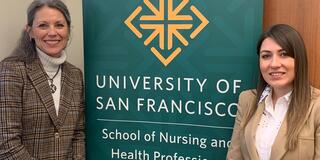An Interview with Aleksandra Kuzmanovic

Aleksandra Kuzmanovic serves as Social Media Manager at the World Health Organization. In this role, she supports and advises the WHO Director-General and the Organization's senior leadership on social media activities. She is also leading WHO's partnerships with social media platforms, including those focused on fighting COVID-19 mis- and disinformation.
Together with the corporate social media team, she co-manages WHO's presence on Facebook, Twitter, LinkedIn, Instagram, TikTok, Pinterest, and Snapchat. Previous to this role, she served as WHO’s Communications Consultant in the Department of Public Health and Environment. She joined WHO in 2015.
Many of our students are interested in your work, particularly how you are combining public health, communications, and social media. How did you get to where you are today?
I’m from Serbia and studied Management & Organization, which included courses on marketing and special events that focused on management and industrial management skills. Then I moved to Geneva to do my Master's in Management Standards, with a focus on sustainable development. This was two years before the United Nations adopted the Sustainable Goals. As part of my Master's, I had to do an internship, and after a few attempts, I was finally accepted into the World Health Organization (WHO), focusing on Health and Environment, and did my thesis on Health and the Determinants of Health.
The WHO internship program is open for applicants! I encourage students that would like to be part of the program to apply and join us! There will be a lot of opportunities for young people around the world to join us.
During the conference "Reimagining Public Sector Communications in the Post-Pandemic Age" this past October, a post the WHO tagged said, "Make your public trust non-negotiable." Can you expand on this key remark?
Using social media is a powerful tool to communicate with broader audiences and people anywhere in the world. It enables us to connect easier and directly, but also we need to make sure when we use communications channels to build trust within the communities we serve. We need to make sure we are not only using social media to broadcast information, but to listen to the community's needs and address their questions. Science is evolving very fast, and in order to maintain or build trust, we need to communicate what we know and what we do not know. During COVID-19, we saw how many debates were happening in front of our eyes. The message is that however we communicate, we need to ensure the community is at the center.
In the United States, there is an intersection between social media around COVID-19, the vaccine, and politics. What is you take on the political influence around public health?
The pandemic touched all spheres of our lives, including economies and societies, on a broader scale. Our leadership encouraged top leaders to be involved in the response. If you have a country's top leaders communicating what’s happening and what they are doing, it helps to build trust. It is a new and complex situation, but we have scientists and health professionals who should use their voices to communicate how health science is evolving. Through the pandemic, we constantly communicated how science was evolving and what we knew and did not know. We were trying to use our channels and elevate the organization's trusted voices worldwide.
Misinformation can be people spreading inaccurate information, but disinformation is an intentional campaign to provide inaccurate information. Can you comment on matters of misinformation and disinformation?
It is not a new phenomenon. Traditionally, and now more than ever, we have people on the ground explaining health matters. You have to consider the cultural context to develop an approach. One of the big lessons is that community engagement is critical. Today, the spread of information is faster, good or inadequate information. We are working on misinformation and disinformation by listening carefully to the community members and working with social media platforms. We need to continue to provide the latest scientific information so social media platforms can update their policies in real-time and mitigate the spread of misinformation or disinformation. However, we are also working on providing education to the public to see the signs or symptoms of misinformation or disinformation and to do a fact check before sharing information. Some social media platforms are recommending for everyone to read beyond the headlines before sharing, and they have data that shows a reduction in misinformation.
It is essential to provide information in people’s language and context to avoid misunderstandings.
What are some of the issues we are facing now that we move from pandemic to endemic? What are the biggest challenges now?
For WHO, COVID-19 is still a public health emergency of international concern. We are working to revive and reshape messages and use social media channels creatively. We are also entering the flu season in the northern hemisphere. People are more interested in health information and using social media to destigmatize the disease.
Students in the health sector and future health professionals can contribute a lot by driving this content in the newest social media platforms.
We continue working on vaccine hesitancy and access. Working with countries to build trust on immunization and access.
What would you tell future health professionals?
This was a great opportunity to address them, thank you. To all future health professionals, make sure you work on your communications skills and reflect on your role as a communicator on social media.
"It was a pleasure to learn about Aleksandra's journey, to discuss health communication from a global perspective, and to reimagine the opportunities our students have to change the world's health," said Dean Fry-Bowers.